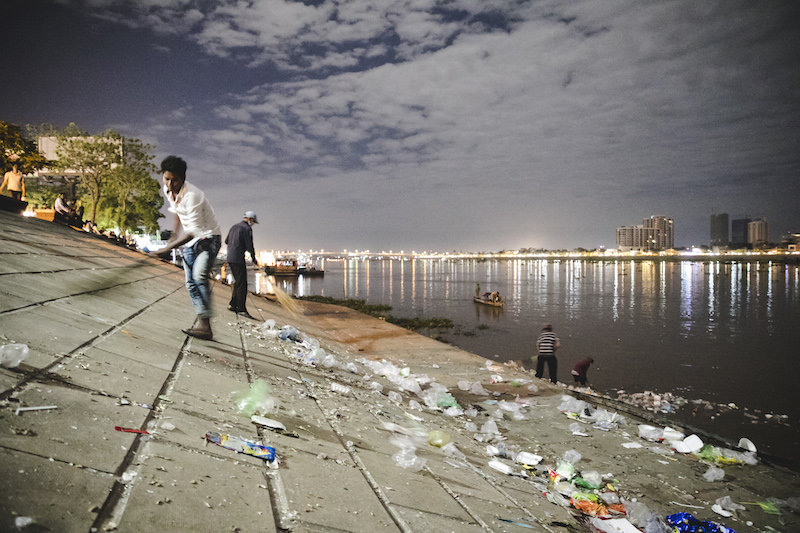Following the Water Festival in Phnom Penh, social media was filled with images of piles of rubbish and the many servicemen simply pushing it into the river.
Some say it is a result of the peoples’ poor sanitation habits, throwing rubbish everywhere. Others attribute it to poor waste management by the city due to limited infrastructure, including lack of regularly emptied rubbish bins.

What is often overlooked, however, is the lack of enforcement and fines for polluting and littering the streets.
The reality is that street rubbish in the city is not solely an issue following major celebrations: It is a daily concern.
According to People in Need-Cambodia and the 2015 Phnom Penh Capital Hall report (“City at Risk? Phnom Penh Hazard, Vulnerability and Capacity Assessment”), 189 communities in Phnom Penh are affected by poor rubbish management annually, having immense consequences on public health.
Unprotected rubbish piles are, above all, breeding grounds for germs, bacteria and viruses, and their vectors—cockroaches, flies, mosquitoes, mice and rats, as well as cats, dogs and humans.
It is an especially big problem in temperate climates such as in Cambodia, where organic waste degrades easily and organisms multiply rapidly. Deaths caused by malaria, dengue, dysentery, typhoid and many other respiratory and diarrheal diseases are rarely attributed to poor waste management. Perhaps it is time they should be.
As many are also aware, in rainy season in Phnom Penh the streets flood during heavy rains, a result of street drainage routes being clogged by excess rubbish.
In the city center, this street flooding does not usually last beyond a few hours. In the outskirts, however, the flooding may persist for weeks, exacerbating existing environmental sanitation problems in poorly developed communities, where drainage infrastructure is insufficient, if it is present at all.
Have you ever wondered what happens with all the rubbish dumped into the rivers and lakes? My first and last fishing trip on the Mekong ended with a trophy of three plastic bags, but that barely captured a sliver of all the trash flowing down the river.
Chemicals and pathogens from rubbish entering our rivers kill aquatic plants and animals, effectively depleting the fish stock in the Mekong basin—one that many Cambodians rely on for their livelihoods. These pathogens also transmit diseases to fish, which are later consumed by humans.
Better enforcement of fines for polluting the streets may be one of the most effective ways to promote behavioral change and improve this issue.
Although some consider it to be too harsh, a strictly enforced fining system for polluting streets and the environment could significantly improve Cambodia’s problem with rubbish.
If waste management services operated more timely and more reliably, there would also probably be much less opposition to this idea.
In cities such as Singapore or Dubai, a fine of nearly $300 is strictly enforced for littering, which has proven to be very successful in reducing rubbish. The additional revenue from those fines may then be invested in improving infrastructure, services and public awareness campaigns.
Perhaps this is the answer to stopping the rubbish monster in Cambodia to make Phnom Penh cleaner and healthier.
It is worth highlighting that one of the fastest-growing sectors in Cambodia’s economy is tourism at approximately 16 percent of GDP. However, this economic growth will be difficult to sustain unless waste management improves dramatically, especially in Phnom Penh and other common tourist spots.
***
Waste management will be one of the topics discussed during the annual City for All! conference on Wednesday through Friday in Phnom Penh. Participants may join the field trip to one of the communities where the local NGO Urban Poor Women Development implements community-based solid waste management projects.
Disclaimer: The views and opinions expressed in this article are those of the author and do not necessarily reflect the views of The Cambodia Daily.